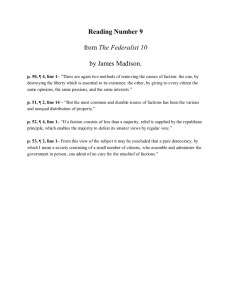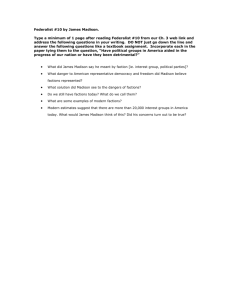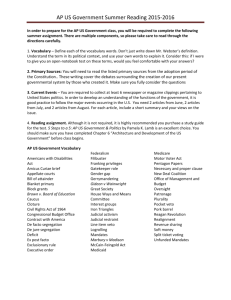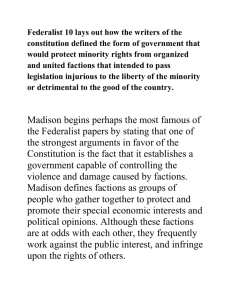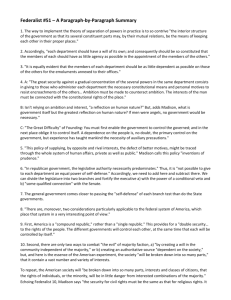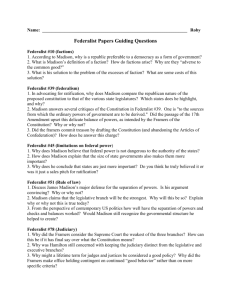AP US GOV Summer Packet
advertisement
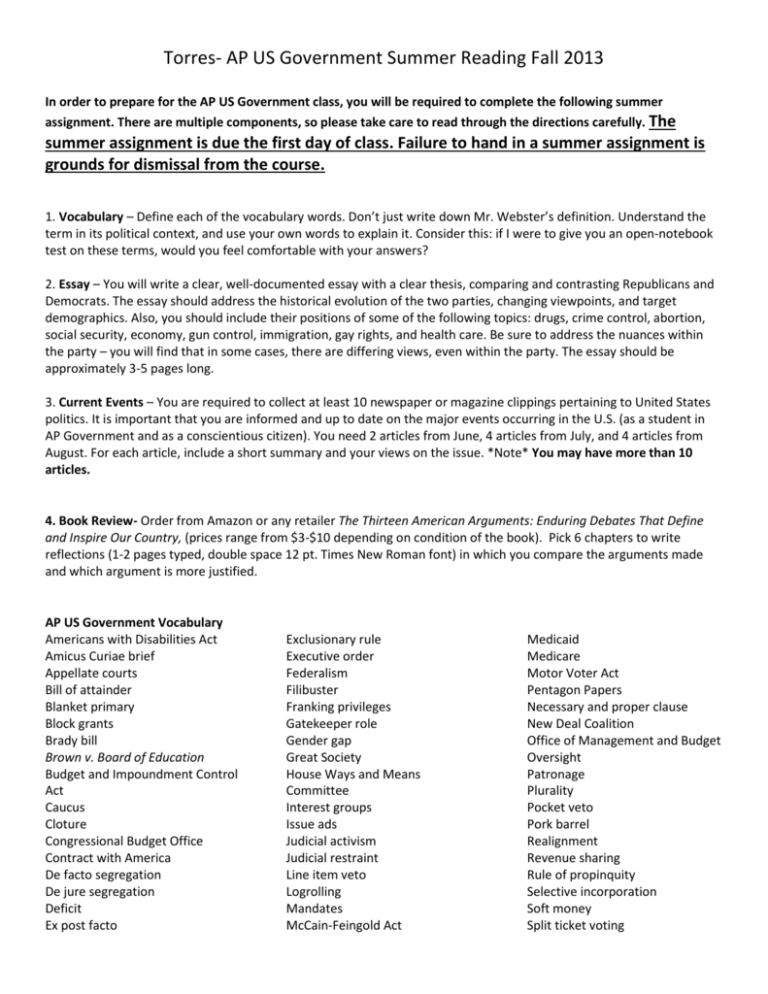
Torres- AP US Government Summer Reading Fall 2013 In order to prepare for the AP US Government class, you will be required to complete the following summer assignment. There are multiple components, so please take care to read through the directions carefully. The summer assignment is due the first day of class. Failure to hand in a summer assignment is grounds for dismissal from the course. 1. Vocabulary – Define each of the vocabulary words. Don’t just write down Mr. Webster’s definition. Understand the term in its political context, and use your own words to explain it. Consider this: if I were to give you an open-notebook test on these terms, would you feel comfortable with your answers? 2. Essay – You will write a clear, well-documented essay with a clear thesis, comparing and contrasting Republicans and Democrats. The essay should address the historical evolution of the two parties, changing viewpoints, and target demographics. Also, you should include their positions of some of the following topics: drugs, crime control, abortion, social security, economy, gun control, immigration, gay rights, and health care. Be sure to address the nuances within the party – you will find that in some cases, there are differing views, even within the party. The essay should be approximately 3-5 pages long. 3. Current Events – You are required to collect at least 10 newspaper or magazine clippings pertaining to United States politics. It is important that you are informed and up to date on the major events occurring in the U.S. (as a student in AP Government and as a conscientious citizen). You need 2 articles from June, 4 articles from July, and 4 articles from August. For each article, include a short summary and your views on the issue. *Note* You may have more than 10 articles. 4. Book Review- Order from Amazon or any retailer The Thirteen American Arguments: Enduring Debates That Define and Inspire Our Country, (prices range from $3-$10 depending on condition of the book). Pick 6 chapters to write reflections (1-2 pages typed, double space 12 pt. Times New Roman font) in which you compare the arguments made and which argument is more justified. AP US Government Vocabulary Americans with Disabilities Act Amicus Curiae brief Appellate courts Bill of attainder Blanket primary Block grants Brady bill Brown v. Board of Education Budget and Impoundment Control Act Caucus Cloture Congressional Budget Office Contract with America De facto segregation De jure segregation Deficit Ex post facto Exclusionary rule Executive order Federalism Filibuster Franking privileges Gatekeeper role Gender gap Great Society House Ways and Means Committee Interest groups Issue ads Judicial activism Judicial restraint Line item veto Logrolling Mandates McCain-Feingold Act Medicaid Medicare Motor Voter Act Pentagon Papers Necessary and proper clause New Deal Coalition Office of Management and Budget Oversight Patronage Plurality Pocket veto Pork barrel Realignment Revenue sharing Rule of propinquity Selective incorporation Soft money Split ticket voting Torres- AP US Government Summer Reading Fall 2013 Stare decisis War Powers Act For this course, it’s important that you understand the basics of our government. Who better to learn the basics from than the men who wrote and argued in favor of the federal constitution proposed at the conclusion of the Constitutional Convention? Each of the Federalist Papers were meant to be persuasive essays in support of the new constitution. Print and read each document from the websites below. Answer the questions below AND highlight the portion of the text that answers each question. It is also suggested that you number the highlighted portion so you know which answer the text relates to. Primary Sources: Federalist 10: http://www.constitution.org/fed/federa10.htm Questions on Federalist Number 10: 1. What are factions, according to Madison and where does he write of them? 2. What are the causes of faction, according to Madison? 3. What is the most common and durable source of faction, according to Madison? 4. How could we cure the "mischiefs of faction," according to Madison? Why are these remedies worse than the disease, according to Madison? 5. What is Madison's solution for controlling the effects of factions? 6. What is a republic, what is a pure democracy, and how do they differ? 7. How does a republic inhibit the effects of factions, according to Madison? Federalist 51: http://www.constitution.org/fed/federa51.htm Questions on Federalist Number 51: 1. Which branch of government did Madison think would be the weakest? 2. Which methods does Madison suggest to check the powers of government? 3. How is the separation of powers between the three branches assured? 4. Which branch appears as an exception to the separation of powers norm? Why is this exception not dangerous? 5. What are the two great advantages of federalism, according to Madison? 6. What is the "end" (supreme goal) of government, according to Madison? 7. What is Madison's view of human nature and how does it affect his prescriptions for the republic? Federalist 78: http://www.constitution.org/fed/federa78.htm Questions on Federalist Number 78: 1. What is important about the new role of the federal judiciary? 2. Why does the judiciary need to be independent in a republic, according to Hamilton? 3. Why do judges need life appointments, according to Hamilton? Do you agree? 4. According to the author, why are the courts vital to a limited constitution? 5. Why does the author believe that judges have permanent tenure? 6. What is the author’s attitude toward the proposed Supreme Court of the United States? Torres- AP US Government Summer Reading Fall 2013 If you have any questions, you can contact me at itorres@crec.org . It may take a few days for me to reply, so do not wait until the last minute to ask questions. The summer assignment is due the first day of class. Failure to hand in a summer assignment is grounds for dismissal from the course.


